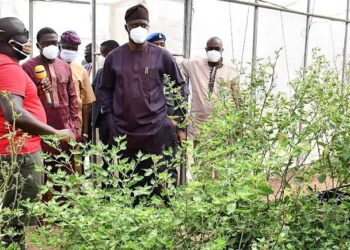
Cassava farmers in Benue State are experiencing a boost in their yields thanks to a cassava seed system intervention. The intervention, known as the Building an Economically Sustainable Integrated Cassava Seed System (BASICS-II) project, has provided farmers with access to clean, disease-free, and high-yielding cassava planting materials. This has resulted in improved varieties that offer significantly higher yields than the average in Nigeria.
Typically, cassava yields in Nigeria are less than nine tons per hectare. However, the improved varieties grown by Cassava Seed Entrepreneurs (CSEs) through the BASICS-II project have yielded 20 tons and above, according to the Sasakawa Africa Association. The farmers are not only enjoying higher yields but are also selling the stems for additional income, thereby contributing to the diffusion of these improved varieties throughout the country.
One farmer, Vitalis Iorlaha, expressed his joy and called the intervention a “life changer.” He emphasized the benefits of being able to sell both cassava roots and stems. The income generated from selling stems has provided an additional source of revenue for the farmers.
The BASICS-II project, led by the International Institute of Tropical Agriculture (IITA), focuses on establishing CSEs that are linked to early generation seed producers and breeder seed producers. The Sasakawa Africa Association (SAA) is incubating CSEs in Benue and Nasarawa states, which are generating income and employment opportunities through the sales of cassava stems. The project has successfully supported the establishment of more than 50 hectares of cassava seed fields across various local governments in these two states.
Dr. Godwin Atser, the Country Director for SAA-Nigeria, believes that these cassava seed entrepreneurs will be at the forefront of a cassava revolution in North Central Nigeria. They will serve as a reliable source of quality planting materials for farmers in the region and beyond.
Farmers in the community spoke highly of the project, highlighting the exposure to improved cassava varieties and the support provided by Sasakawa through training and inputs that have made cultivation easier. The project has acted as a catalyst for agricultural development in the community, according to the farmers.
Some farmers, like Rosemary Usoo and Nyitse Nyaregh, have transitioned into seed producers through the BASICS-II project. Despite being new to the guidelines for seed production, they are determined to follow them to maximize the benefits. These guidelines are established by the National Agricultural Seed Council (NASC) to ensure that CSEs receive the right early generation planting materials and that their fields are certified. By following these guidelines, the CSEs can sell their stems in the market, as the stems are the target for seed producers while the roots are considered additional.
Overall, this cassava seed system intervention has brought about positive changes for cassava farmers in Benue State. Higher yields, additional income from selling cassava stems, and improved access to quality planting materials have all contributed to the success and excitement surrounding the BASICS-II project.











